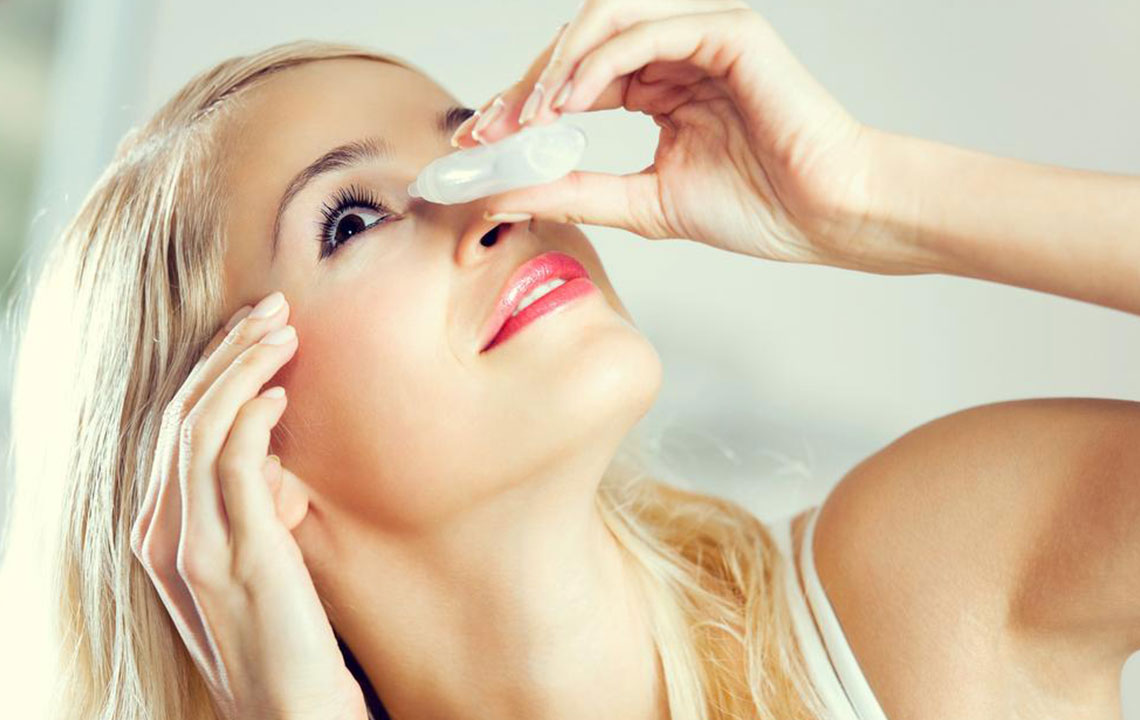Here are the Most Common Causes of Dry Eyes and its Treatment Options
Tears are a mixture of fatty oils, water, and mucus. It helps in keeping the surface of the eyes smooth and clear, which further helps in protecting the eyes from infection. With age, the tendency to produce tears reduces in both, men and women. This could be due to hormonal changes. Dry eyes are common in women who have gone through menopause.
One of the most common causes that decrease tear production is increased tear evaporation and an imbalance in the make of tears.

One of the common causes of dry eyes is that it is unable to produce enough tears. Medically, this condition is called as keratoconjunctivitis sicca. It could be due to aging, medical conditions such as diabetes, arthritis, Sjogren’s syndrome, thyroid disorders, or simply due to vitamin A deficiency. Some of the common causes of dry eyes are as follows:
- There are certain medications such as antihistamines, decongestants, antidepressant drugs, and hormone replacement therapy that can contribute to being some of the common causes of dry eyes.
- Parkinson’s disease can also cause dry eyes.
- Tear gland damage and laser eye surgery can also bring about dry eyes. But because it is a surgical procedure, the symptom can be temporary.
- Increased tear evaporation is also one of the common causes of dry eyes. The common causes of tear evaporation include the wind, smoke, or dry air. It also occurs due to reading, driving, or working at a computer for long hours.
- People who have ectropion which is another name of out-turned eyelids can also cause dry eyes.
- As discussed above, the three basic components of tears, oil, water, and mucus, produce a film with the help of small glands called Meibomian glands that are present at the corner of the eye. When these glands are clogged or blocked, the production of tears decreases. This condition is called as blepharitis or rosacea.
- Contact lenses interfere with the layers of the eye that primarily help in protecting them. They cause the tears to evaporate, thereby leaving your eyes with a burning sensation.
- Dry air, irrespective of indoors or outdoors, is also one of the common causes of dry eyes. People living in dry climate regions have higher chances of developing dry eyes. Indoors (like hospitals, airplanes, or work environments) with 24×7 air conditioning or heat.
- Polyneuropathy is a diabetic form of nerve damage, which injures the network of nerves in various parts of the body. In this case, if this condition damages the front layer of the eye (specifically cornea), it causes the person to blink less. This interferes with the tear production and causes the tears to evaporate more easily.
- Dry eyes are synonymous with allergies thereby making it one of the common causes of dry eyes. A research suggests that dry eyes are more common during spring, the season where the pollen count is the highest. They also peak during winters due to indoor heating. Dry eyes are one of the side effects of allergy medications.
People experiencing these symptoms of dry eyes should consult an eye care professional that would guide them to know the causes of dry eyes and give a treatment strategy. Some of these treatments are listed below:
- Over-the-counter medications
Dry eye symptoms that are mild may be treated with over-the-counter topical medications like artificial tears, gels, etc. Dry eyes medications prescribed by the doctor. Medications like cyclosporine are medications that are strictly prescribed by the doctors. These medications are approved by the US Food and Drug Administration that treat the symptoms of dry eye. Topical medications such as corticosteroids eye drops can be prescribed by a doctor for a very short term to reduce inflammation caused due to dry eyes. - Change in medications
One of the causes of dry eyes could be the change of medications to alternative ones. Consult your physician if you are thinking to change your medication, as some medications can alleviate the symptoms of dry eyes. - FDA approved devices
These devices stimulate Meibomian glands which produce tears. Thereby, providing temporary relief. - Punctal plugs
As a surgical option, these plugs made of silicone or collagen are inserted near the tear gland that will partially or completely plug the tear ducts helping the eyes to keep the tears from draining. If the condition is chronic, a surgical procedure to close the drainage ducts using thermal punctal cautery may be recommended which will close the tear ducts permanently. - Fatty acids
Fatty acids such as omega-3 and omega-6 also help to relieve the symptoms of dry eyes. They can be taken in the form of supplements or from foods that are rich in omega-3 and omega-6 fatty acids. - Eyedrops containing castor oil
You can use castor oil to get relief from dry eyes. You can also consume them in the form of supplements or through foods that are rich in castor oil.There are some eyedrops that are added with some preservatives to prolong the shelf life. Using them on a long run can cause eye irritation. Non-preservative eye drops come in use and throw vials, so one can use the vials as per their need and then dispose of the vials.
Disclaimer:
The content provided on our blog site traverses numerous categories, offering readers valuable and practical information. Readers can use the editorial team’s research and data to gain more insights into their topics of interest. However, they are requested not to treat the articles as conclusive. The website team cannot be held responsible for differences in data or inaccuracies found across other platforms. Please also note that the site might also miss out on various schemes and offers available that the readers may find more beneficial than the ones we cover.